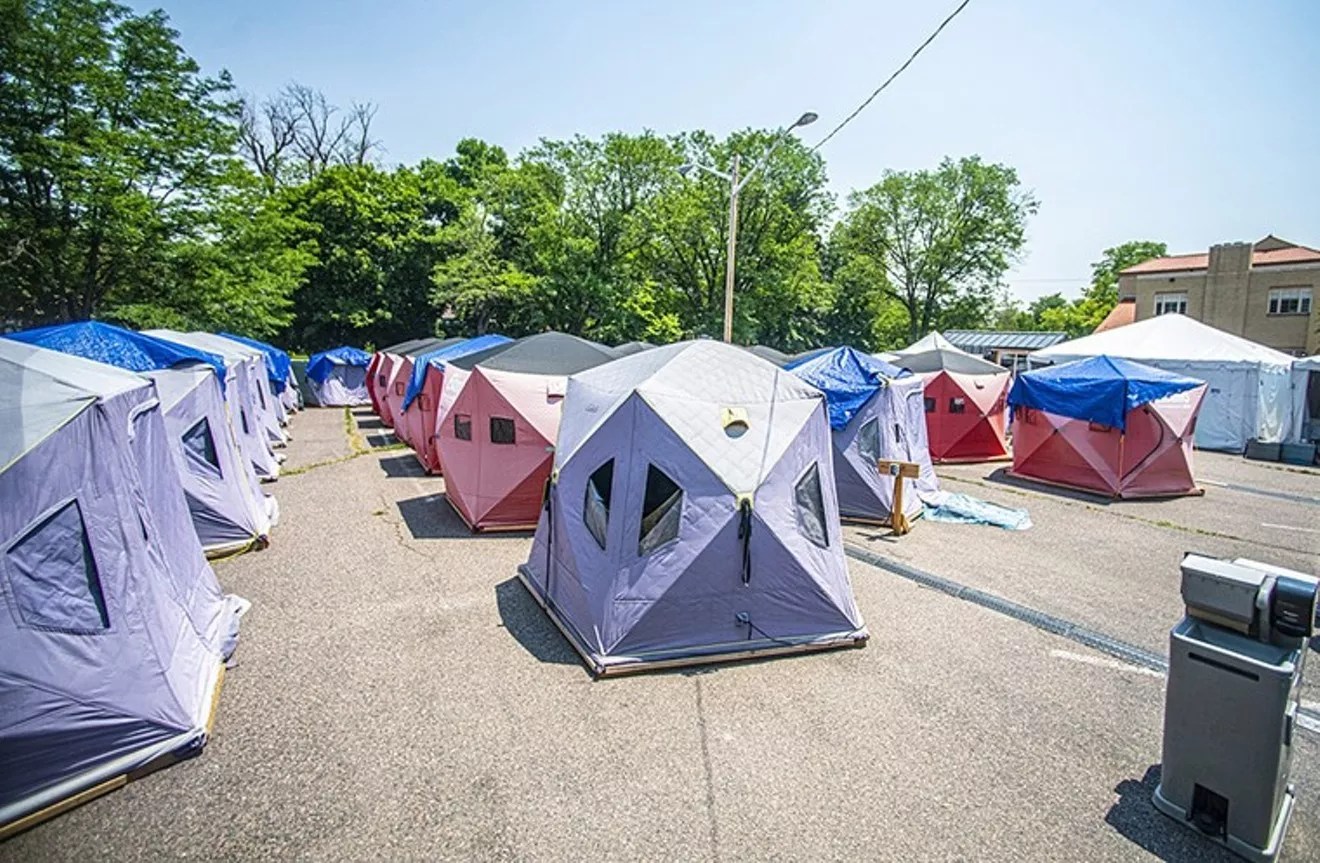
Evan Semón

Audio By Carbonatix
With a new study indicating that unsheltered homelessness in metro Denver is much higher than previously thought, Denver City Council will soon vote on putting more money into safe-camping sites.
“It’s a very big deal, and we’re very excited about the support we have from the city and from city council and the community, and we look forward to being able to make good on the faith they’re putting in us,” says Cole Chandler, executive director of the Colorado Village Collaborative, which runs Denver’s three existing safe-camping sites for people experiencing homelessness.
On January 26, Denver City Council’s Safety, Housing, Education and Homelessness Committee will vote on whether to earmark $3.9 million for the Colorado Village Collaborative’s safe-camping site program, which turns parking lots into outdoor communities, setting up uniform tents with centralized access to sanitation and services. If approved by the committee, the full council will vote on the expanded funding next month.
“It’s not a surprise, because these are funds that were spoken to in the mayor’s budget,” Chandler acknowledges. “What this demonstrates is that the city is becoming more aggressive on an issue that’s becoming a bigger challenge in a city where [up to] 40 percent of our homeless population is living outdoors.”
That 40 percent figure over the course of a year was documented in a study released earlier this month by the Metro Denver Homelessness Initiative; earlier estimates had indicated the portion at 25 percent per night. While the pandemic could have contributed to the growth in this segment of the homeless population, the MDHI also had access to better data for this study, since service providers have been tracking unsheltered homelessness more closely over the past year.
Last night, January 24, service providers conducted the 2022 Point in Time survey, an annual count of people experiencing homelessness in the metro area on a given night. The 2021 count did not include unsheltered individuals because of concerns about the possible spread of COVID. In 2020, the study counted around 1,000 people who were unsheltered; this year, organizers expect the figure will be much higher.
The proposed funding for the CVC highlights a remarkable expansion for a nonprofit organization that until recently had been a relatively small entity. In 2020, the CVC had a city contract worth $120,000 that it used to create tiny-home villages. At the time, there were just three people on staff.
A year later, the CVC got around $1.2 million in city contracts for not just tiny-home villages but safe-camping sites, the first of which went up in December 2020. Add $330,000 for tiny-home villages to the $3.9 million proposed for safe-camping sites, and the CVC will receive a total of $4.2 million from the City of Denver this year.
The organization’s staff now includes over thirty people. Currently, the CVC operates a safe-camping site in partnership with the St. Francis Center at Regis University, a second site on a parking lot owned by Denver Health at 780 Elati Street, and a third site at 3815 Steele Street, on a city-owned parking lot next to a Denver Human Services building.
With the Regis University site set to shut down by the end of March, the CVC is hoping to soon sign on two more locations, so that the city will have four safe-camping sites that will serve 370 people over the year. The CVC is aiming to get ninety of those individuals into more permanent housing.
Although the administration of Mayor Michael Hancock has long opposed outdoor camping by people experiencing homelessness, it has now fully embraced safe-camping sites. But not everyone welcomes them.
The announcement of almost every new site has generated neighbor opposition; the most pronounced came from a handful of neighbors who tried to block a now-defunct site at Park Hill United Methodist Church. One of their lawsuits remains pending in Denver District Court.
Neighbors around the Denver Health-owned site and three landowners next to the Denver Human Services site have filed appeals with the Denver Board of Adjustment for Zoning Appeals. The Board of Adjustment hearing for the DHS site is set for February 15.
The Park Hill residents who took issue with the safe-camping site in their neighborhood filed two appeals with the board. One appeal focused on the overall authority of Denver zoning administrator Tina Axelrad to create a temporary use for safe-camping sites, which aren’t listed as approved uses in the code. The board rejected that appeal in July 2021 in a 3-2 vote. In August, the board voted 3-2 in favor of a Park Hill site-specific appeal. Since a supermajority of four votes is needed to sustain an appeal, however, the challenge was rejected.
Chandler says that he expects such challenges to continue, but he also suggests that the city could figure out a way to streamline processes so that service providers and government officials don’t expend too many resources on the challenges.
“As this continues to move forward,” he says, “there’s definitely a need from a higher-level policy perspective to be addressing that.”